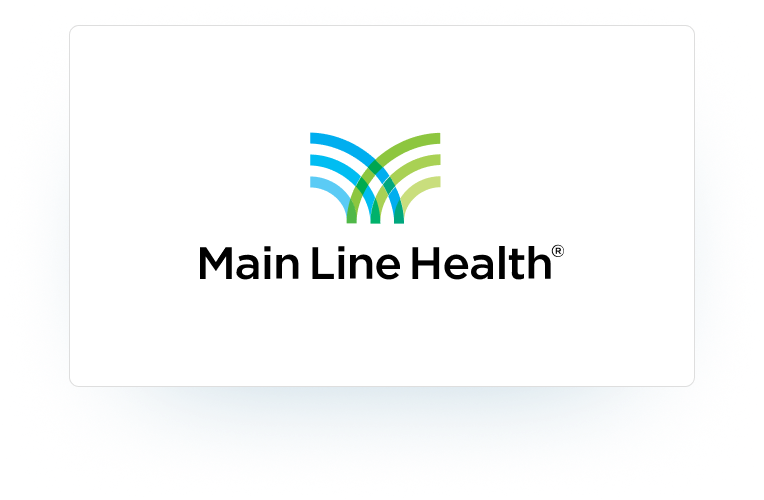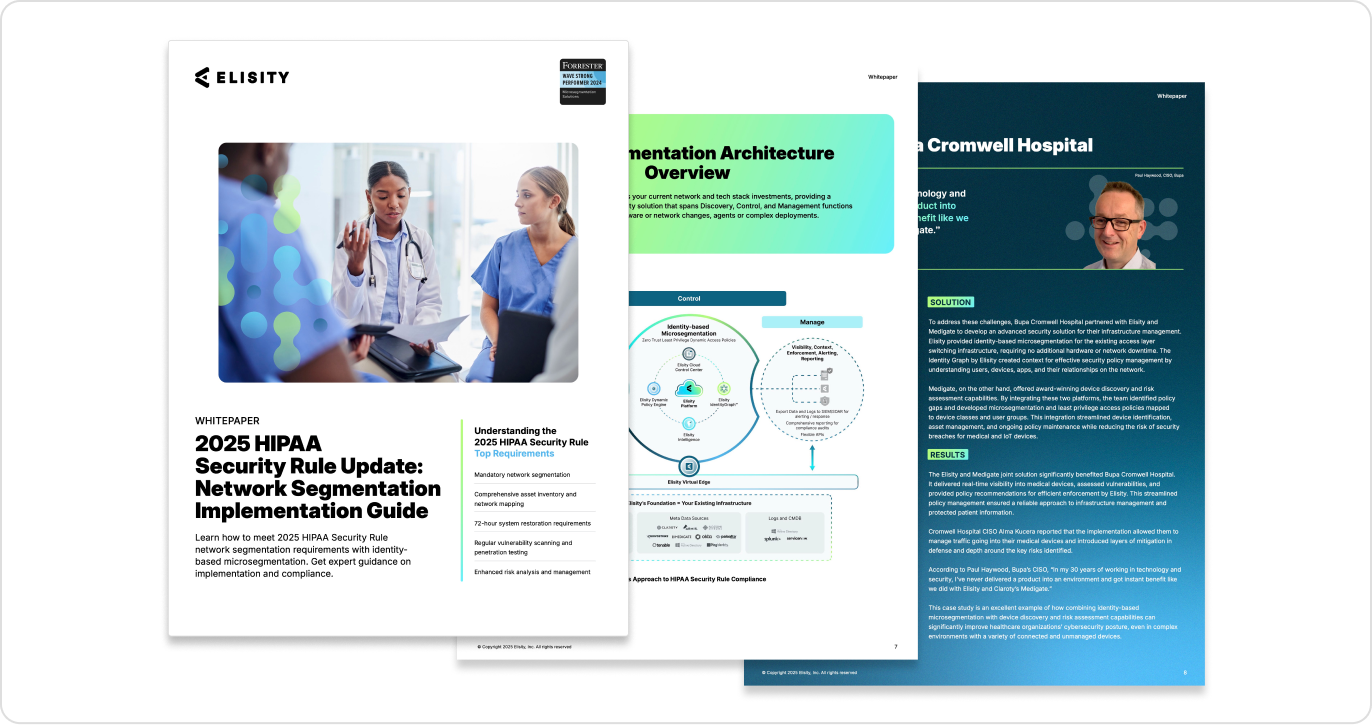Healthcare Institutions
Healthcare Network Segmentation with Medical Device Microsegmentation
Digital transformation has dramatically shifted the security landscape for healthcare organizations as medical devices, clinical systems, and patient care networks become increasingly interconnected. Elisity's identity-based microsegmentation empowers healthcare enterprises to secure their complex environments, prevent lateral movement attacks, and maintain patient care continuity while achieving HIPAA compliance and HHS 405(d) best practices without clinical disruption
Challenges
Healthcare organizations with 300+ beds, multiple hospitals and clinics face mounting security challenges as legacy medical systems connect to enterprise networks. Traditional network segmentation approaches struggle to protect these complex environments without disrupting critical clinical workflows or requiring expensive infrastructure upgrades.



Customer Spotlight
“Elisity has changed how we look at microsegmentation solutions overall and we have now experienced how Elisity is the easiest to implement and easiest to manage.”
— Aaron Weismann, CISO, Main Line Health
Network Segmentation Without Compromise
Webinar On Demand
Learn how healthcare leaders are making microsegmentation a reality in weeks, not years, with practical steps to achieve Zero Trust without disrupting care delivery.
The Numbers
Main Line Health deploys Elisity microsegmentation enterprise-wide across their Cisco infrastructure with Armis integration, providing comprehensive protection at every facility with network presence.
6,000+
Actively Enforced Policies
+100k
IoT, OT, and IoMT Devices Protected
150
Hospitals, Health centers and physicians' practices
3
Days to Deploy
Challenge
Expanded Attack Surface
The proliferation of connected medical and IoT devices has expanded the attack surface across clinical environments, creating new attack vectors that cybercriminals exploit to gain unauthorized access to critical patient care systems and protected health information (PHI). With thousands of devices spanning multiple facilities, healthcare organizations struggle to maintain visibility and control.

Elisity Solution
Comprehensive Healthcare Visibility
Elisity IdentityGraph™ transforms your switches into data sensors that automatically discover and classify all connected devices—including medical equipment, IoMT devices, clinical workstations, and building management systems—providing complete visibility across your entire healthcare environment without disrupting patient care. This visibility extends across all facilities in your healthcare system.
Challenge
Legacy Medical Device Vulnerabilities
Clinical devices and IoMT systems often run legacy software, proprietary operating systems, or have long replacement cycles, making them impossible to patch regularly or secure with traditional endpoint solutions. These devices represent a significant portion of a healthcare organization's infrastructure but remain largely unprotected by conventional security tools.

Elisity Solution
HIPAA-Compliant Segmentation
Easily implement the network segmentation controls required by the 2025 HIPAA Security Rule update through identity-based policy groups that logically segment your clinical environment without complex VLAN configurations or network architecture changes. Our solution aligns with HHS 405(d) guidelines to help you achieve favorable regulatory treatment.
Challenge
HIPAA Compliance Complexity
Meeting stringent HIPAA Security Rule requirements, especially the new 2025 mandated network segmentation controls, becomes increasingly difficult with traditional approaches that require complex VLAN configurations and static firewall rules. HHS 405(d) Health Industry Cybersecurity Practices (HICP) further emphasizes the need for robust network protection through segmentation.

Elisity Solution
Zero-Disruption Deployment
Deploy medical microsegmentation using your existing network infrastructure without requiring new hardware, device agents, or clinical downtime—maintaining continuous patient care operations critical to healthcare environments with multiple facilities and thousands of caregivers.
Clinical Continuity
Healthcare organizations cannot tolerate disruptions to patient care that traditional security implementations often require, creating resistance to implementing proper security controls while maintaining 24/7 clinical operations across multiple hospitals and specialty clinics.

Elisity Solution
Phased Security Implementation
Roll out your fine-tuned policies in waves using Elisity's Simulation Mode to analyze policy impact, identify potential issues, and refine policies before full-scale deployment, safeguarding your clinical operations while strengthening security posture across your entire healthcare organization.
Resources
Download the 2025 HIPAA Security Rule Update: Network Segmentation Implementation Guide
Discover how Elisity's identity-based microsegmentation helps healthcare organizations meet the 2025 HIPAA Security Rule's mandatory network segmentation requirements without disrupting critical operations

Get Started
Stop East-West Attacks, Microsegment Your Networks
Healthcare Networks & Medical Device Security FAQ
See how Elisity helps healthcare organizations secure legacy and connected medical devices while maintaining compliance and clinical operations. These FAQs answer the most common questions from security and clinical engineering teams.
Elisity’s identity-based microsegmentation secures each device at the network level without requiring any software on the device. By limiting communications to only what’s necessary for care, it shields legacy and unpatchable medical equipment from threats.
Yes, Elisity automatically discovers and classifies all connected medical devices, then enforces healthcare-specific segmentation policies that protect patient data. It also provides the documentation and visibility needed to demonstrate compliance with industry security requirements.
No, Elisity’s solution is non-disruptive and uses your existing network, so you can roll out security policies without any downtime. You can even simulate and verify policies before enforcement to ensure there’s no impact on essential healthcare operations.
Elisity consolidates network access control into one platform that’s aware of clinical context. This unified, automated approach means fewer consoles to manage and consistent enforcement across all devices, freeing up your team from manual device-by-device configurations.
Resources

9 Lateral Movement Techniques Attackers Use (and How to Stop Them)

Best Network Access Control (NAC) for Industrial & OT Networks [2026]

How to Automate Palo Alto Networks Dynamic Address Groups with Identity-Based Classification
Ready to Prevent Lateral Movement? Secure Your Network in Weeks, Not Years
Don't wait for attackers to exploit your east-west traffic security policy gaps. Implement Elisity's identity-based microsegmentation without agents, hardware, or network changes. Discover 99% of all users, workloads, and devices in one day, create dynamic least privilege policies, and prevent lateral movement—all while leveraging your existing infrastructure. Schedule your personalized demo today.
Schedule Time With Us




